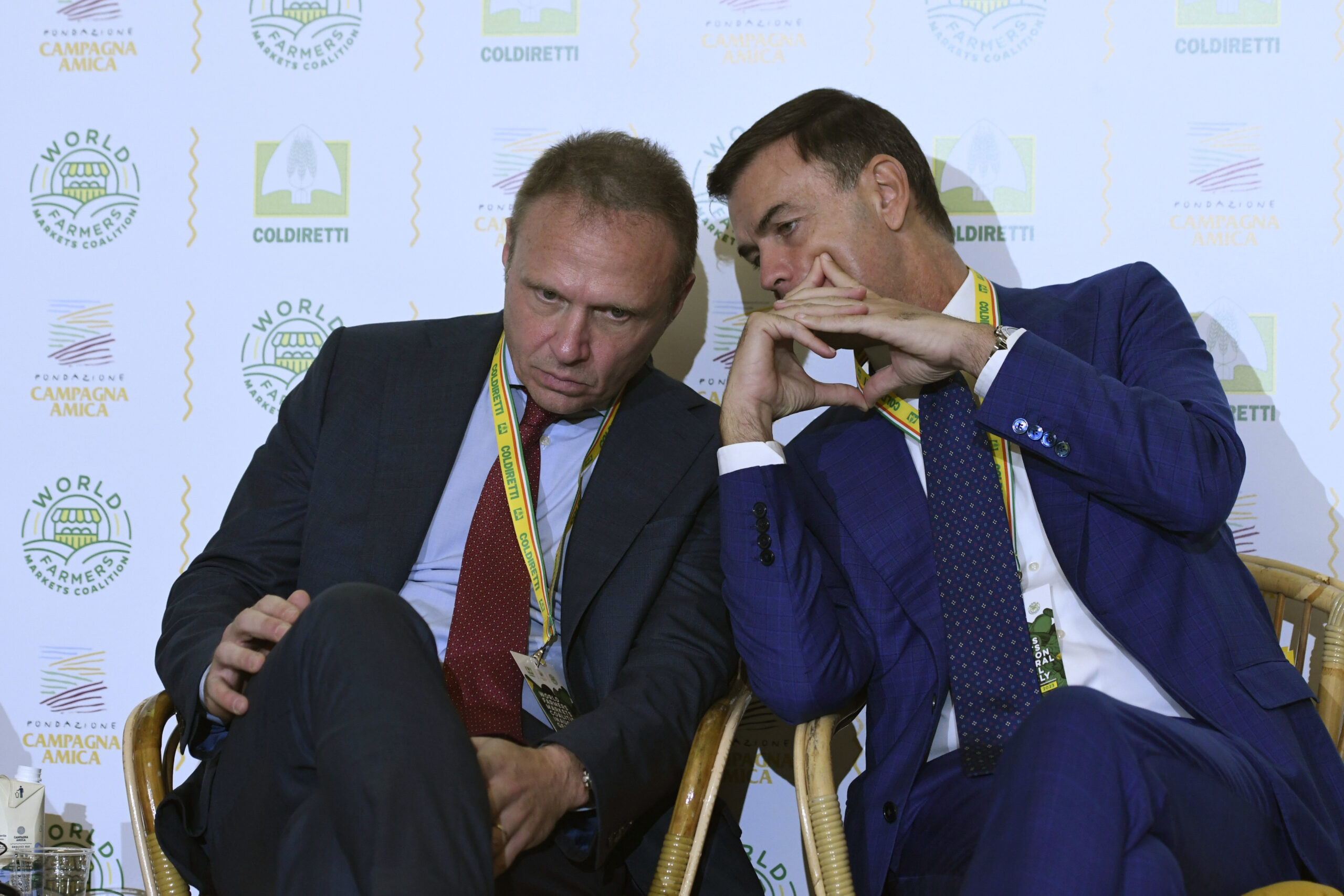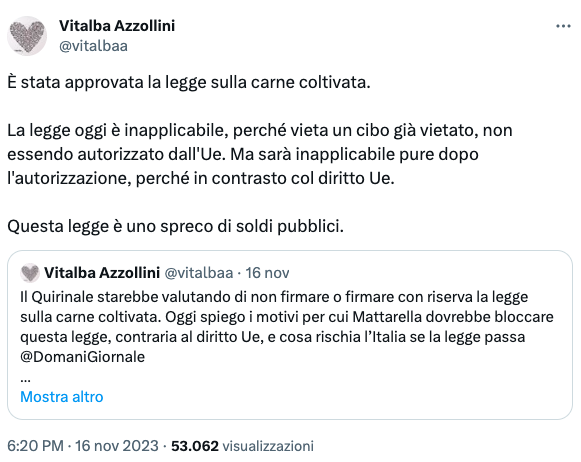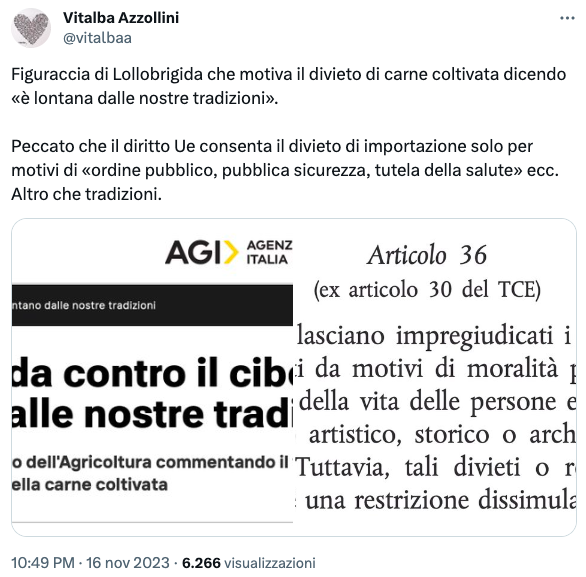But what the heck is going on with cultured meat?

And it was law. Italy – future EU recalls aside – officially has its own law banning cultured meat. Here's what it predicts and above all how the rest of the world is moving, which are the major companies that produce it and the forecasts for this market
Italy is going straight as a train in its battle against cultured meat or, as the executive prefers to call it, synthetic meat. Yesterday, in fact, the provision that bans laboratory-produced meat in our country – a crusade strenuously fought by the Minister of Agriculture, Francesco Lollobrigida, and the Minister of Health, Orazio Schillaci – officially became law with 159 votes in favour, 53 against ( +Europa, M5S and Green-Left Alliance) and the abstention of the deputies of Pd and Action.
The law establishes both a production and trade ban and provides for fines of 10 to 60 thousand euros for violators or up to 10% of the turnover achieved in a year up to a maximum of 150 thousand euros.
As anticipated at the end of March by Lollobrigida, this is the first rule of this type worldwide, although it remains to be seen what the European Union will say given that: first, the all-Italian law for now prohibits something already prohibited since there are no authorized synthetic foods; second, if cultured meat were approved by the EU, the ban could not be applied to products legally manufactured or marketed in another member state because there are community rules on the free circulation of goods and services which do not require each country to act as wants, “except in rare exceptions such as national security.”
The law, therefore, as reiterated by jurist Vitalba Azzollini, is "inapplicable" and "exposes Italy to an EU infringement". The tradition, included by Lollobrigida to justify an outlaw law, underlines Azzollini, only makes the minister and the government make yet another ignorant fool .


But Italian squabbles aside, what is the situation in Europe and the rest of the world?
WHAT HAPPENS IN THE EU
The European Union, after an initial burst of enthusiasm for cultured meat, has for the moment retraced its steps, also due to Italy's united resistance. In February , in fact, before things in our country got hot, the spokesperson of the European Commission, Stefan De Keersmaecker, had implied that, with a clear and non-misleading label for consumers, a "hamburger" produced in a laboratory would be could reach the tables.
In September , however – to the great satisfaction of Italian MEPs of all political parties – the Agriculture and Rural Development Committee of the European Parliament rejected the production and marketing of "innovative cell-based products", the so-called "synthetic" food, supporting instead assisted evolution techniques (TEA) to increase protein production and European food independence.
However, these innovative techniques are not regulated in the same way by European legislation and by that of individual countries. Italy, for example, recently approved a regulation that "unblocks field testing of plants obtained with Tea", while this is not possible under European legislation.
The Netherlands, however, could go against the grain and become the first European country to clear cultured meat through customs. Last July, in fact, the Dutch companies Mosa Meat and Meatable obtained the green light from the government to conduct "tastings" for experimental purposes which should precede the approval of laboratory-grown foods.
WHAT HAPPENS IN THE WORLD
Broadening our gaze to the rest of the world, to date, the retail sale of cultured meat has only been authorized in Singapore since December 2020 and in the United States since last June , exclusively for chicken products made by Upside Foods and Good Meat.
There are currently two restaurants: one in Singapore and the other in Israel , the only case comparable to the city-state for funding for startups and infrastructure dedicated to the sector. In Tel Aviv, where the issue also has to do with religion, the world's first experimental cultured meat restaurant, produced in the nearby factory of the Israeli company SuperMeat , opened in November 2020.
HOW CULTURED MEAT IS PRODUCED
It is called cultivated and not synthetic because, as Laura Di Renzo, director of the Tor Vergata food science school, and Cesare Gargioli, stem cell and tissue engineering laboratory, explained to Corriere della Sera , "it is produced starting from an animal cell, taken with a biopsy and then grown in the laboratory with the use of natural nourishing factors".
There is nothing synthetic because "synthetic means something that derives from a synthesis of multiple elements", while in the case of cultured meat "no genetic modification or manipulation occurs".
In terms of safety, for the two experts, "from a procedural point of view it is a safe, non-contaminated food", however, "we do not yet know the long-term effect on health as it is only on the market in some parts". of the world and for a few years."
WHICH ARE THE MAJOR MANUFACTURING COMPANIES
According to the Global Food Institute's 2022 report , the meat sector – but also cultivated fish (Japan and Singapore are collaborating to commercialize it in 2027) – has more than 150 companies, 2.8 billion dollars in permanent investments in companies dedicated and $896 million invested last year.
Singapore, per the Economist , is the world leader in the sale of cultured meat. Last year alone, annual private funding for alternative protein companies based in the city-state doubled to $170 million. However, the only company in the sector to have received approval in the country is the American Good Meat. The green light from the United States, however, should worry Singapore because the vast consumer market and cutting-edge technology of the United States could threaten its primacy.
In addition to the aforementioned Good Meat, among the major companies dealing with cultured meat are the American Upside Foods and the Israeli Aleph Farms, Tnuva, Sartorius and SuperMeat, also united in a consortium .
A SMALL MARKET
The forecast for this market, however, does not look rosy. The difficulties of large-scale production and the resulting cost to consumers are faced by the global economic situation at a time when most people are looking to save. The cultured meat market is expected to reach $0.2 billion in 2023 and $1.1 billion by 2034, according to a report published by Markets and Markets.
But to give an idea of how small the sector is compared to the "traditional" one, the Economist gives the example of Good Meat in Singapore, which sells less than 2,300 kg of cultivated chicken per year, while the world production of meat this year will grow to over 360 million tons.
This is a machine translation from Italian language of a post published on Start Magazine at the URL https://www.startmag.it/economia/ma-che-diamine-succede-sulla-carne-coltivata-detta-anche-sintetica/ on Fri, 17 Nov 2023 15:05:48 +0000.
